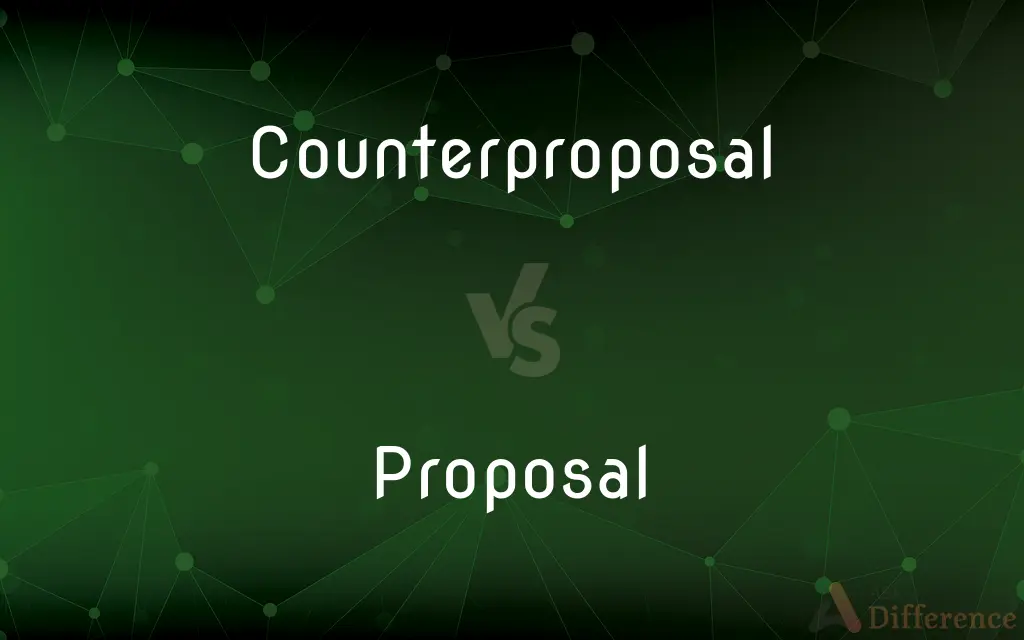Counterproposal vs. Proposal — What's the Difference?
By Tayyaba Rehman & Fiza Rafique — Updated on May 21, 2024
A proposal is an initial plan or suggestion presented for consideration, while a counterproposal is a response to a proposal, offering an alternative plan or modifications to the original.

Difference Between Counterproposal and Proposal
Table of Contents
ADVERTISEMENT
Key Differences
A proposal is an original idea or plan presented for consideration or approval. It often outlines specific objectives, strategies, and desired outcomes. Proposals are typically used in business, academic, and governmental contexts to suggest new projects or changes. A counterproposal, on the other hand, is a response to an existing proposal. It offers an alternative plan, modifications, or adjustments to the original suggestion. Counterproposals are common in negotiations and discussions where the initial proposal may not fully meet all parties' needs or expectations.
In negotiations, a proposal sets the stage for discussions, outlining what one party wants or aims to achieve. Conversely, a counterproposal reflects the other party's feedback, suggesting adjustments that could make the proposal more acceptable.
Proposals are generally detailed documents, often including background information, objectives, methods, and anticipated benefits. They aim to convince the audience of the feasibility and desirability of the proposed idea. Counterproposals, while also detailed, focus more on addressing specific points of disagreement or suggesting improvements. They aim to bridge gaps between differing viewpoints and reach a mutually satisfactory agreement.
Proposals initiate the discussion process, laying the groundwork for negotiations or decision-making. Counterproposals keep the conversation going, facilitating adjustments and compromises to refine the initial idea.
Both proposals and counterproposals are essential in collaborative environments, helping to develop ideas through iterative feedback and revisions, ultimately leading to better-informed decisions.
ADVERTISEMENT
Comparison Chart
Purpose
Present initial plan or suggestion
Offer alternative or modifications to initial plan
Context
Used in business, academics, government
Common in negotiations and discussions
Content
Includes background, objectives, methods, benefits
Focuses on adjustments, improvements, addressing disagreements
Role in Process
Initiates discussion or decision-making
Facilitates adjustments and compromises
Objective
Convince audience of feasibility and desirability
Bridge gaps between differing viewpoints
Compare with Definitions
Counterproposal
A written document outlining a new idea.
Her proposal for the research grant was well-received.
Proposal
A revised plan addressing concerns of the original proposal.
Their counterproposal included additional safety measures.
Counterproposal
A formal suggestion for a new plan or project.
The team submitted a proposal for the new marketing strategy.
Proposal
A response that modifies the initial offer.
The counterproposal adjusted the project’s timeline.
Counterproposal
A detailed plan or suggestion put forward for consideration.
The proposal included budget estimates and timelines.
Proposal
A proposal made to counter another.
She drafted a counterproposal to address budget constraints.
Counterproposal
The act of proposing something.
The proposal to extend the deadline was approved.
Proposal
An alternative suggestion made in response to a proposal.
The management received a counterproposal from the union.
Counterproposal
An offer of marriage.
He made a romantic proposal at sunset.
Proposal
A negotiation tactic to find common ground.
The counterproposal helped move the discussions forward.
Counterproposal
A proposal offered to nullify or substitute for a previous one.
Proposal
The act of proposing.
Counterproposal
A proposal made as an alternative to another, earlier proposal.
Proposal
A plan that is proposed.
Counterproposal
A proposal offered as an alternative to an earlier proposal
Proposal
An offer of marriage.
Proposal
Something which is proposed, or offered for consideration or acceptance
Proposal
A scheme or design
Proposals for the construction of a new building
Proposal
The terms or conditions proposed
To make proposals for a treaty of peace
Proposal
The document on which such a thing is written.
Proposal
The act of asking someone to be one's spouse; an offer of marriage
Proposal
(legal) The offer by a party of what he has in view as to an intended business transaction, which, with acceptance, constitutes a contract.
Proposal
That which is proposed, or propounded for consideration or acceptance; a scheme or design; terms or conditions proposed; offer; as, to make proposals for a treaty of peace; to offer proposals for erecting a building; to make proposals of marriage.
Proposal
The offer by a party of what he has in view as to an intended business transaction, which, with acceptance, constitutes a contract.
Proposal
Something proposed (such as a plan or assumption)
Proposal
An offer of marriage
Proposal
The act of making a proposal;
They listened to her proposal
Common Curiosities
When is a proposal used?
A proposal is used in business, academic, and governmental contexts to suggest new projects or changes.
What is a counterproposal?
A counterproposal is an alternative plan or modification offered in response to an initial proposal.
What does a proposal typically include?
A proposal typically includes background information, objectives, methods, and anticipated benefits.
What does a counterproposal focus on?
A counterproposal focuses on addressing specific points of disagreement or suggesting improvements.
When is a counterproposal used?
A counterproposal is used in negotiations and discussions to address disagreements or improve the initial proposal.
How does a counterproposal facilitate adjustments?
A counterproposal offers alternative solutions, helping to refine the initial idea and reach a mutually satisfactory agreement.
How does a proposal initiate discussions?
A proposal lays out what one party wants to achieve, setting the stage for negotiations or decision-making.
What is a proposal?
A proposal is an initial plan or suggestion presented for consideration or approval.
Can a proposal be rejected?
Yes, a proposal can be rejected if it doesn't meet the needs or expectations of the decision-makers.
What is the main goal of a counterproposal?
The main goal of a counterproposal is to bridge gaps between differing viewpoints and refine the initial proposal.
Why are counterproposals important?
Counterproposals are important because they enable adjustments and compromises, improving the chances of reaching a consensus.
Why are proposals important?
Proposals are important because they initiate new ideas and projects, providing a structured plan for consideration.
How do proposals and counterproposals work together?
Proposals and counterproposals work together by initiating and refining ideas through iterative feedback, leading to better-informed decisions.
Can a counterproposal be negotiated further?
Yes, a counterproposal can be negotiated further to find common ground and reach an agreement.
What is the main goal of a proposal?
The main goal of a proposal is to convince the audience of the feasibility and desirability of the proposed idea.
Share Your Discovery

Previous Comparison
Jv vs. Varsity
Next Comparison
Lariat vs. ClotheslineAuthor Spotlight
Written by
Tayyaba RehmanTayyaba Rehman is a distinguished writer, currently serving as a primary contributor to askdifference.com. As a researcher in semantics and etymology, Tayyaba's passion for the complexity of languages and their distinctions has found a perfect home on the platform. Tayyaba delves into the intricacies of language, distinguishing between commonly confused words and phrases, thereby providing clarity for readers worldwide.
Co-written by
Fiza RafiqueFiza Rafique is a skilled content writer at AskDifference.com, where she meticulously refines and enhances written pieces. Drawing from her vast editorial expertise, Fiza ensures clarity, accuracy, and precision in every article. Passionate about language, she continually seeks to elevate the quality of content for readers worldwide.











































